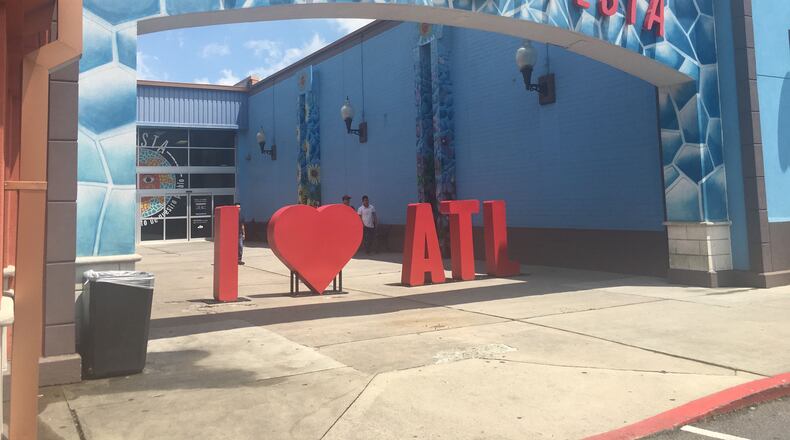Federal immigration authorities said Wednesday they will ramp up enforcement, though they offered few specifics, sowing fear and confusion among Atlanta-area immigrants and drawing sharp criticism from Atlanta Mayor Keisha Lance Bottoms.
Acting U.S. Immigration and Customs Enforcement Director Mark Morgan declined to say how many and which people would be targeted, or where and when ICE’s efforts would begin.
But he highlighted Central American families who have been ordered deported in absentia after failing to win asylum here and then skipping their immigration proceedings. Their presence in the U.S., he said in a conference call with reporters, “is evidence that the system has failed and our removal efforts need to increase.”
Morgan spoke two days after President Donald Trump announced on Twitter that ICE next week would “begin the process of removing the millions of illegal aliens who have illicitly found their way into the U.S. They will be removed as fast as they come in.” Trump fired off his tweet a day before he announced his reelection campaign in Orlando, where he continued to sound off about immigration.
There were an estimated 375,000 immigrants living illegally in Georgia in 2017, down from a high of 425,000 a decade ago, according to the Pew Research Center.
Five county sheriffs in Georgia – including those in Cobb and Gwinnett counties – have teamed up with ICE to help identify unauthorized immigrants in their jails and help deport them. In contrast, Bottoms decided last year to bar the city jail from holding ICE’s detainees, prompting a rebuke from Vice President Mike Pence during his visit to Atlanta in March. Bottoms has said her move was prompted by the Trump administration’s “zero-tolerance” immigration policy on the southwest border, which led to the separation of many immigrant families last year.
“Rather than reforming a broken system, their plan is to detain and deport men, women and children,” the mayor said in a prepared statement Wednesday. “This president is placing our country’s humanity in peril, creating a nightmare for families just wanting a fair shot at the American dream.”
Immigration attorney Arturo Corso said his law office in Gainesville began fielding anxious phone calls soon after Trump’s Monday tweet.
“Of course, just like when Trump was first elected, my clients that are noncitizens are very scared, very nervous,” Corso said. “They don’t know exactly what to make of it.”
The tension was palpable Wednesday at Plaza Fiesta, a cavernous and bustling shopping center in DeKalb County that features homemade wooden vases, clay pots and traditional Mexican-style dresses. Among the shoppers were Carlos, his wife and young son. A Mexican family without legal status in the U.S., they declined to give their last name.
“Many people are starting to be afraid about going into the streets or to work,” said Carlos as his wife asked him about buying a Jesus figurine pinned to a gold-embossed cross.
Ashley Portillo, 17, said her Mexican mother is similarly worried.
“She’s always been cautious, but she’s more cautious now, especially since (Trump) has been posting about the ICE raids,” said Portillo, who was born in the U.S. “I feel like everybody is more cautious now.”
But Christopher Decca, a native of Venezuela who obtained asylum in the U.S., sympathizes with the president.
“Trump has to deal with a lot of problems he didn’t create,” said Decca, 49. “Maybe if he has another four years he can do something about it.”
Immigration laws prevent the Trump administration from immediately deporting asylum-seeking Central American families, who make up a majority of the migrants arrested at the border. The operation planned by ICE officials would instead target those in the interior of the country who have been issued a final removal order or missed their court date.
An operation targeting families also would not immediately result in the deportation of millions of unauthorized immigrants, according to The New York Times, citing unnamed government officials who were not authorized to speak publicly about the details of the coming operation or Trump’s tweet.
ICE charters planes that carry only a couple of hundred migrants back to Central America daily. While roughly 1 million unauthorized immigrants have been issued removal orders, many of them may be appealing their cases and cannot be deported. The roughly 6,000 deportation officers in ICE also do not know the locations of many of the migrants.
Juan Patino, who sells snacks in a small booth in Plaza Fiesta, said he is not afraid. He came here from Mexico in 1987 looking for work and says he is now a U.S. citizen. So is his wife and three of his children, while four children are in Mexico. The majority of Hispanics who come to the U.S., he said, come here for work, like him.
“There are bad immigrants who do bad things,” said Patino, 83. “But the majority are good people who come here to work.”
Yaslin Turruviates, a U.S. citizen of Mexican descent, said her godmother doesn’t have legal papers, which makes it hard for her to travel in America.
“Any day they can stop her, and she can be deported,” said Turruviates, 20. “There are little kids who rely on their parents who are immigrants. And if they get deported, who are they going to be going to? Many immigrants have their lives here and don’t have anything over there.”
Corso, the Gainesville immigration attorney, is offering callers some simple advice: Don’t panic, limit what you tell any federal immigration authorities you encounter and quickly adjust your legal status, if possible. He added he is skeptical of the president’s claim, pointing out federal immigration authorities have limited resources, including officers and detention beds.
The New York Times contributed to this article.
Keep Reading
The Latest
Featured




